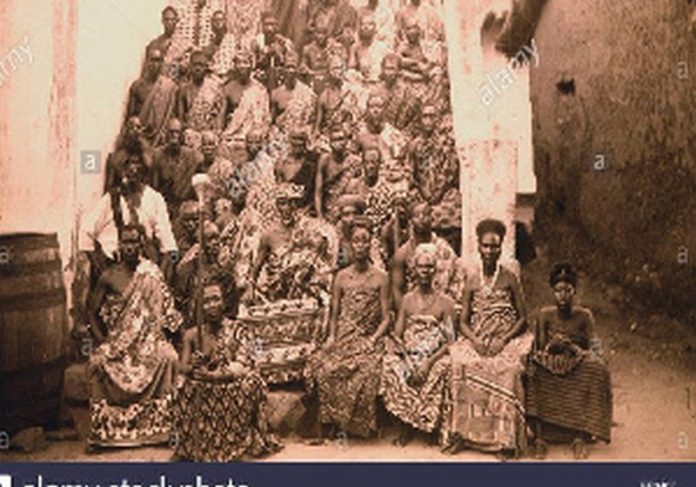He was exiled to Sierra Leone because he defied the colonial government and turned down an offer of a bribe from the Europeans.
He refused to hoist the English flag on the Elmina Castle and sign off his rights as king and pay allegiance to the British government.
This was the crime of the Elmina King, Kobena Gyan, who was exiled for 21 years for challenging the colonial authority on grounds that he was born a free man. With that show of defiance, Kobena Gyan’s fate was sealed.
In the West African nation of Ghana, a square has been erected in his honor with a statue in remembrance of the bravery and values he stood for.
Nana Kobena Gyan I was born in Elmina to Kobina Conduah on February 13, 1821. He ascended the throne in 1863 and acted as an influential spokesperson for the Elmina community. But, the British government fell out with the traditional leaders when Kobena Gyan and two other sub-chiefs, Tando Mensa and Kwamina Ekum, refused to take an oath of allegiance to the English flag.
This, according to Brand Elmina, was to test their loyalty, but, two chiefs fluttered due to the fear of the European powers when they were invited at dawn on March 12, 1873.
The Elmina District Commissioner, Hendrik Vroom, said when Governor Pope Hennesey made that request on the chiefs, Kobena Gyan told them that before the Dutch government built the Elmina Castle, they were free men under no one’s rule.
Edward Ulzen Memorial Foundation in its manuscripts of what transpired that fateful day recounted that Kobena Gyan expressed his inalienable rights by pointing out that the Dutch disrespected him by not consulting him as king before erecting the castle.
Kobena Gyan pointed out he felt disrespected and disgraced that some of his subjects had connived with the British power to hoist a flag on the Elmina castle.
He refused to accept the authority of the flag despite some sub-chiefs compelling him to, insisting that, he would not sign any papers to accede to colonial authority.
Many folks in Elmina, the coastal community in West Africa, remember Kobena Gyan with a lot of fondness because he refused a large sum of money from the British Governor to allow the transfer of the castle to the Europeans.
The king, according to Ghana Museums, did not only refuse the bribe but rejected the offer to take an oath of allegiance. He is remembered as telling to the Governor that he was not afraid of their powers even on the verge of death.
Kobena Gyan is said to have taken a fetish oath to oppose the English government from coming to Elmina and he was prepared to defend the oath with his life.
That accounted for the arrest of Kobena Gyan and two dissident chiefs who were exiled in Sierra Leone without any charges or trial on April 30, 1873.
Every year libation is poured in remembrance for the act of valor and staying true to his conviction in the face of intimidation and bribery, according to Brand Elmina.
Kobena Gyan was to be brought back from Elmina after several petitions to the British government. He was to return to Elmina in 1877 on the condition that he would be regarded as a private citizen. But historians say that he “reasoned that he was exiled as king and rejected the terms.” He, therefore, prolonged his exile and came back to Elmina on May 17, 1894. Some sources say he was proclaimed king again in 1894.
Nana Kobena Gyan as he is affectionately called died on March 12, 1896, and was buried at Dutch Cemetery at Elmina.

